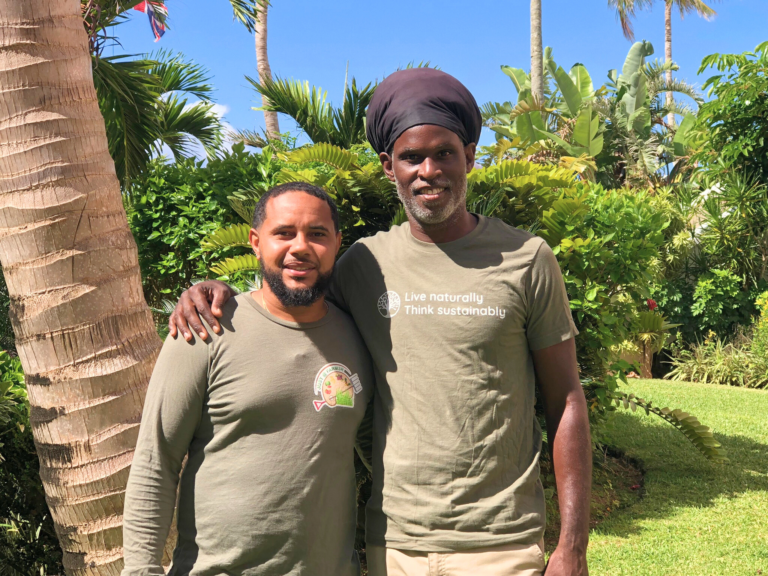For early inhabitants of Bermuda, survival on this tiny rock in the middle of the Atlantic Ocean was directly tied to their ability to successfully manage the natural resources to cultivate a sustainable and self-sufficient agricultural ecosystem.
Since the end of WWII, however, increasing contact with the world at large and adoption of associated consumerism have brought us to the point where we are much more “disconnected” from the natural world – in short, we have lost sight of the consequences that our actions and choices are having on our island home.
And yet, Bermuda remains a closed eco-system which paradoxically means that we are also uniquely positioned to re-develop a truly sustainable and self-sufficient agricultural ecosystem rooted in the principles of permaculture.
I sat down with Mr. Eugene Dean, the Founder of Greenrock and Agricultural Engineer Mr. Malachi Symonds to gain a better understanding of some of the opportunities and challenges we are currently facing.
WHAT IS SUSTAINABILITY?
“Sustainability is the art of closing circles,” says Mr. Malachi Symonds. “For example, if a chicken eats plant material, and then subsequently produces waste that is used to fertilize the soil, which in turn produces more plant material for the chicken to eat – that is a closed circle which is sustainable.”
How much do you feel the average island resident really understands about sustainability?
“The way we have been living for the last 50 years has taken us away from the concept of living in harmony with nature,” says Mr. Eugene Dean. “You know the world is completely upside down when natural processes are being referred to as ‘alternative’”.
“Right now, the focus is largely working to buy stuff, as opposed to creating what you need for yourself from what you have around you,” he said.
WHAT IS PERMACULTURE?
According to Google, permaculture can be defined as a design philosophy which incorporates principles from ecology, landscape design, and environmental science, to create a farming system that harmonizes (or mimics) natural processes.
If you plant a berry from a cedar tree and subsequently grow a tree the same size as the initial tree that the berry came from within your lifetime, then you have utilized the principles of permaculture to achieve sustainability.
How does the philosophy of “working with, rather than against, nature” manifest in practical permaculture practices?
Successful permaculture utilizes the principles of observation to gradually create a farm that is its own eco-system. “You essentially embark on a learning journey whereby you watch to see how your farm responds naturally and make adjustments based on what you learn,” Mr. Symonds explained.
How does permaculture differ from traditional commercial farming?
Unlike traditional farming, which typically utilizes chemical fertilizer and pesticides which are harmful to the environment, and the practice of monoculture (planting only one crop per field), permaculture which utilizes “interplanting” of crops positively enhances soil fertility, water conservation, and ultimately reduces waste.
“It not only encourages people to reconnect with the land and food production, but it also challenges you to come up with ways to utilize everything you have access to instead of throwing it away,” he said. “Rather than throwing unused food away, for example, you would turn it into compost which nourishes the soil or turn your vegetable scraps into soup stock.”
How does interplanting crops help mitigate issues like soil erosion and nutrient depletion in Bermuda?
In Bermuda’s unique climatic and soil conditions mixing several different types of crops together in the same field at the same time mitigates soil erosion and nutrient depletion. This technique helps by providing continuous vegetation cover to the soil (which helps retain moisture) and also allows taller crops to provide both partial shade and to act as a windbreak to small plants.
The decomposition of intercropped plants also returns essential organic matter to the soil which ultimately enhances soil structure and fertility.
How might permaculture contribute to building a more self-reliant and resilient society in Bermuda?
“When you have development without consciousness it leads to social and environmental degradation,” says Mr. Dean. “But when we are conscious and thoughtful we are in harmony and the principles of permaculture actually nurture economic stability because they reduce (if not eliminate) waste because they prioritize utilizing renewable resources and maximizing efficiency”.
“The challenge is that people need to see working examples to understand how they can do this themselves,” says Mr. Symonds. “Right now, the perception is that it is very expensive and time consuming to start an organic vegetable garden because we have been conditioned to believe that we have to purchase all of the supplies from a store – but this doesn’t have to be the case if you employ a few basic techniques and a little creativity.”
THE FUTURE OF FARMING
Overall, permaculture offers a holistic approach to farming that aims to create sustainable, self-sufficient, and resilient agricultural systems, contrasting with the depleting and resource-intensive nature of traditional farming.
Although a move toward permaculture will require farmers and government departments to work together to design and implement updated policies that protect Bermuda’s natural resources and the wellbeing of its people, it is a task worth undertaking.
As Bermuda faces the pressing need to reconnect with sustainable agricultural practices, permaculture offers a promising path forward. By fostering a deep understanding of natural processes and emphasizing resource efficiency, permaculture not only addresses critical issues like soil erosion and nutrient depletion but also promotes a self-reliant and resilient society.

